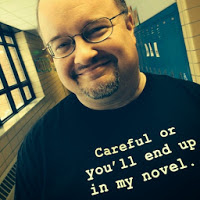Title: Enter Title Here
Author: Rahul Kanakia
Author: Rahul Kanakia
Genre: YA Contemporary
Pages: 352 pages
Publication date: August 2, 2016
Publisher: Disney-Hyperion
Website: http://blotter-paper.com/
My Rating: 5 / 5
Not too many books promise you an unlikable character on the first page. And I'd say even fewer books put the fact that you'll be following a full-blown antihero right on the cover. It's rare. It's risky. And in order to pull it off effectively, I'm pretty sure the author needs to be either some world-building savant or a literary mad scientist.
Lucky for Rahul Kanakia, he's a bit of both.
Reshma Kapoor, the self-proclaimed best-of-the-best in her class, has one goal: to get into Stanford. But having the highest GPA and a laundry list of extra curriculars isn't enough. She needs something that will get her noticed in the stack of applicants. Her solution is simple (according to her). She's going to write a killer YA novel.
Now this is all revealed early in chapter one. And from then on, Reshma becomes a workaholic bulldozer, flattening anything and anyone who gets in her way of Stanford stardom. Her vision becomes so tunneled that she doesn't bat an eyelash when it comes to deciding how she'll manage her valedictorian victory. She quickly proves that she'll do whatever it takes to keep her status as the top student.
Seriously. Whatever it takes.
I kept waiting for the moment when I slammed the book closed and tossed it across the room. But I never did. In fact, I began developing a very strong respect for Reshma. And that's because Rahul gives her endless amounts of motivation for her actions. Reshma has every reason in the world to act the way she does and her drive to become the best is something we can all relate to in one way or another. I'm convinced that Reshma--while perfectly existing as the main character in her world--could easily exist as the antagonist in a companion novel. In fact, there are several characters Reshma interacts with who could fit the mold of "protagonist." But I love that they don't. Because even though she possesses so many qualities of the typical mean girl, Reshma's never the villain. She's the determined, resourceful, intelligent, and occasionally self-deprecating hero that we end up cheering for at times and cringing over at others.
And that's why Enter Title Here gets a hefty five stars. Because it's more than just a fantastic story. It's also a lesson on craft, motivation, and character building. It's a 352-page manual of how important and satisfying it can be to take a trope and tear it, twist it, wad it up so much that you find a way to present something old in a brand new way.
Add it on Goodreads.
My Rating: 5 / 5
Not too many books promise you an unlikable character on the first page. And I'd say even fewer books put the fact that you'll be following a full-blown antihero right on the cover. It's rare. It's risky. And in order to pull it off effectively, I'm pretty sure the author needs to be either some world-building savant or a literary mad scientist.
Lucky for Rahul Kanakia, he's a bit of both.
Reshma Kapoor, the self-proclaimed best-of-the-best in her class, has one goal: to get into Stanford. But having the highest GPA and a laundry list of extra curriculars isn't enough. She needs something that will get her noticed in the stack of applicants. Her solution is simple (according to her). She's going to write a killer YA novel.
Now this is all revealed early in chapter one. And from then on, Reshma becomes a workaholic bulldozer, flattening anything and anyone who gets in her way of Stanford stardom. Her vision becomes so tunneled that she doesn't bat an eyelash when it comes to deciding how she'll manage her valedictorian victory. She quickly proves that she'll do whatever it takes to keep her status as the top student.
Seriously. Whatever it takes.
I kept waiting for the moment when I slammed the book closed and tossed it across the room. But I never did. In fact, I began developing a very strong respect for Reshma. And that's because Rahul gives her endless amounts of motivation for her actions. Reshma has every reason in the world to act the way she does and her drive to become the best is something we can all relate to in one way or another. I'm convinced that Reshma--while perfectly existing as the main character in her world--could easily exist as the antagonist in a companion novel. In fact, there are several characters Reshma interacts with who could fit the mold of "protagonist." But I love that they don't. Because even though she possesses so many qualities of the typical mean girl, Reshma's never the villain. She's the determined, resourceful, intelligent, and occasionally self-deprecating hero that we end up cheering for at times and cringing over at others.
And that's why Enter Title Here gets a hefty five stars. Because it's more than just a fantastic story. It's also a lesson on craft, motivation, and character building. It's a 352-page manual of how important and satisfying it can be to take a trope and tear it, twist it, wad it up so much that you find a way to present something old in a brand new way.
Add it on Goodreads.













